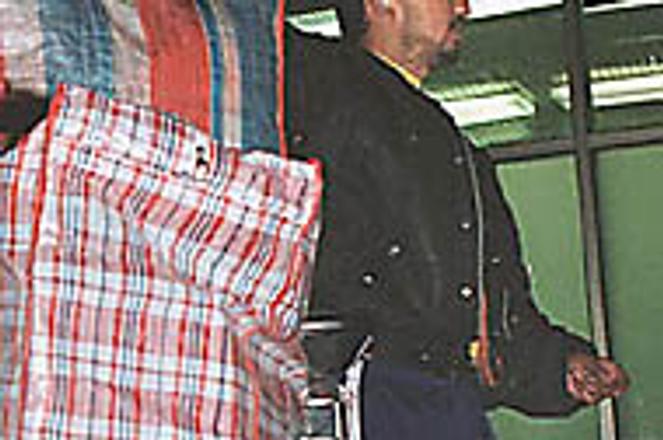Two of the 74 Slovak Roma who returned to Košice in October 1999. With them were the Čonka family.photo: TASR
A Slovak Roma family who sought asylum in Belgium in 1998 is suing the Belgian government for allegedly violating the family's human rights while expelling them from the country. The case entered its first hearing May 15 at the European Court of Human Rights in Strasbourg.
Slovak Roma Ján Čonka, his wife Mária Čonková and their children Naďa and Nikola alleged that their human rights were violated in October 1999 (11 months after they had first entered Belgium to request asylum) when Belgian authorities ushered them and a group of 70 other Slovak Roma onto an aircraft bound for Košice, a city in the east of Slovakia.
The family says that they were first tricked into appearing at a Belgian police headquarters, then had numbers written onto their arms as means of identification, and were sent back to Slovakia before they had received the results of an appeal they'd filed disputing an initial asylum rejection by the Belgian authorities.
While a decision in the suit is not expected until later this year, Slovak Roma analysts and NGOs predict the case will serve as a warning to western countries dealing with migrations of Slovak Roma, which began in earnest in late 1997.
These countries, the analysts said, will be called on to deal with asylum requests on an individual basis, rather than deciding them en masse whenever a group of asylum-claiming Roma hail from a so-called 'safe' country, from which European states agree minority groups have no reason to flee.
"Most likely, the court will issue an 'elegant' [symbolic rather than substantial] signal to developed European countries that they should be very careful when judging individual asylum applications," said Klára Orgovánová, head of the Inforoma NGO.
She added that the widely held assumption among Slovaks that Roma were "economic tourists" seeking asylum in EU countries to gain "social benefits, at which point the asylum seekers return home with the money", did not fit the individual circumstances of all emigrating Slovak Roma.
Surprise departure
Čonka and his family left for Belgium in November 1998, where they applied for political asylum on the grounds of having been repeatedly attacked by skinheads in their native eastern Slovakia. Their asylum applications were rejected by the Belgian General Commission for Refugees and Stateless Persons June 18, 1999. On August 3, 1999, the Čonka's appealed the decision to the Belgium Conseil d'Etat, a senior legal body.
But before receiving a decision from the Conseil d'Etat, the Čonka family alleges, they and 70 other Slovak Roma received a notice October 1, 1999 from Belgian police in Ghent (where they were awaiting their appeal decision) stating that they had to appear in person to fill out a form for their asylum application. Once at the police station, the applicants were arrested and prohibited from communicating with anyone outside.
The Roma were then allegedly taken to Brussels airport where they were first informed that they were being deported. They were also told that any appeal against the deportation order would not be heard.
In a European Court of Human Rights press release, Čonka said that he and his family had become victims of a "collective expulsion of aliens", which is prohibited by the European Convention on Human Rights. With the aid of the Belgian NGO Human Rights League, he lodged a complaint three days after being deported on March 13, 2001. The court dismissed some of the charges, but agreed to deliberate on others [neither the Čonkas nor the Belgian NGO were available to comment on this story].
A final verdict is expected at the end of summer 2001, but could come later than November, said a European Court official, who spoke to The Slovak Spectator on condition of anonymity.
Stereotyping the Roma
Michal Vašečka, an analyst with the Bratislava-based Institute for Public Affairs (IVO) think-tank, said that the case presented a difficult situation for the European Court, and signified that Slovakia's 'Roma problem' was growing into a European-wide issue.
"By collectively returning the asylum seekers, the Belgian government was probably trying to protect itself from a potential flood of more Slovak Roma asylum seekers," Vašečka said. "The authorities sent them back in an effort to say that Belgium would not grant asylum to people coming from the 'safe countries'."
But international law states that each asylum seeker's application must be judged individually, Vašečka said. Problems arose when countries exploited the list of 'safe countries' as "a guideline for many countries to decide on accepting or refusing asylum applications", instead of taking into account individual experiences.
Inforoma's Orgovánová said that the list should not affect asylum-granting decisions, as Roma from safe countries often had just cause for fleeing. "It's definitely not the case that all Slovak Roma who seek asylum fall into the category [of those seeking benefits rather than genuine asylum]," she said.


